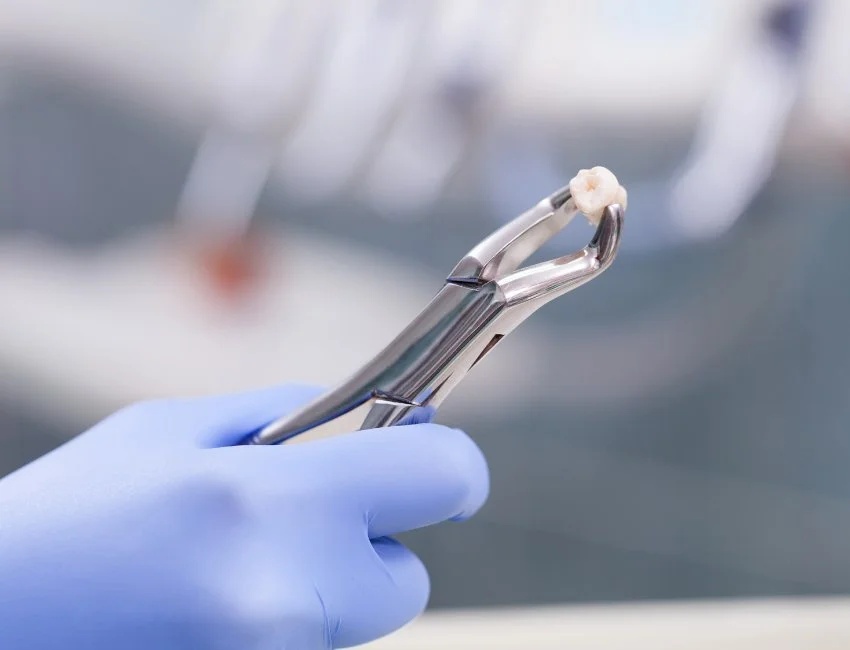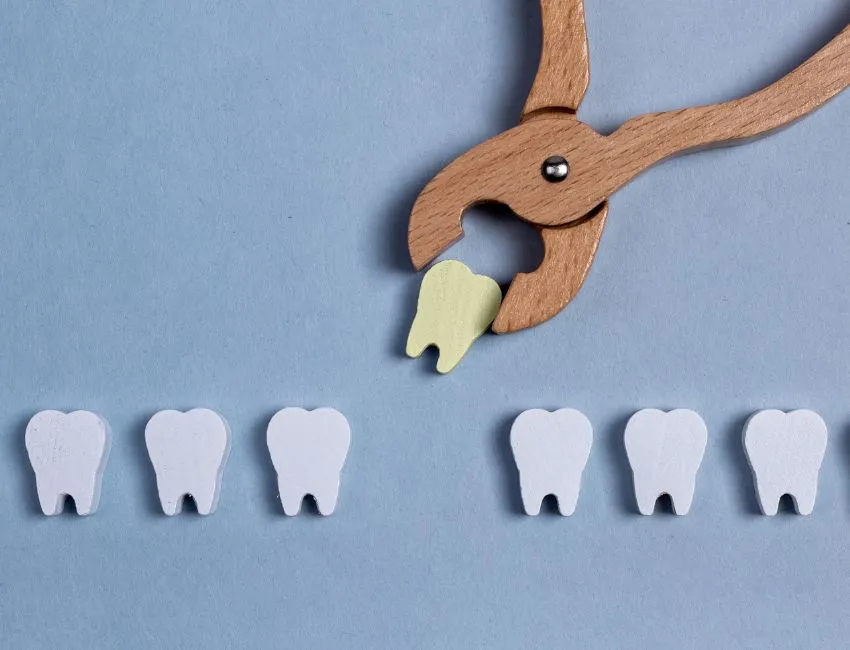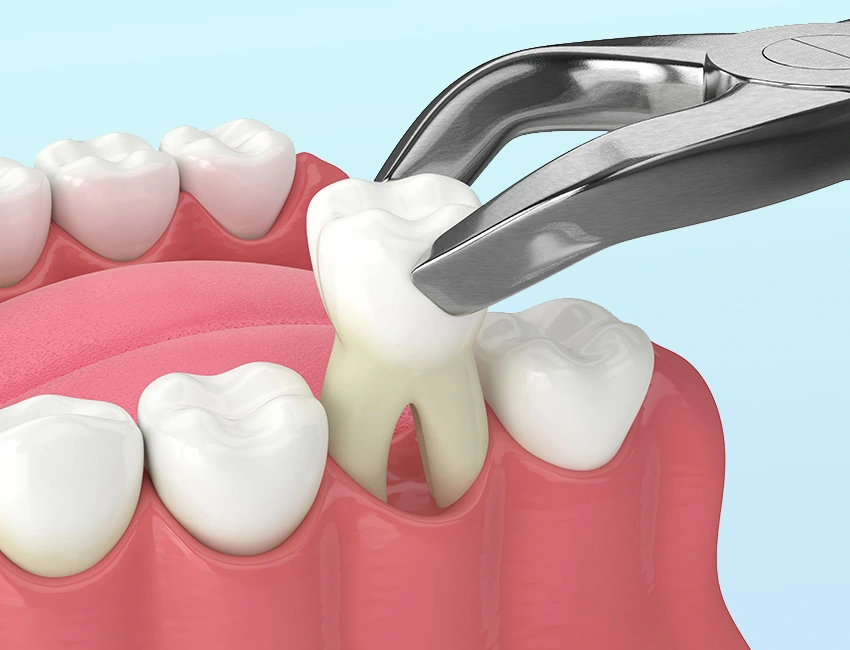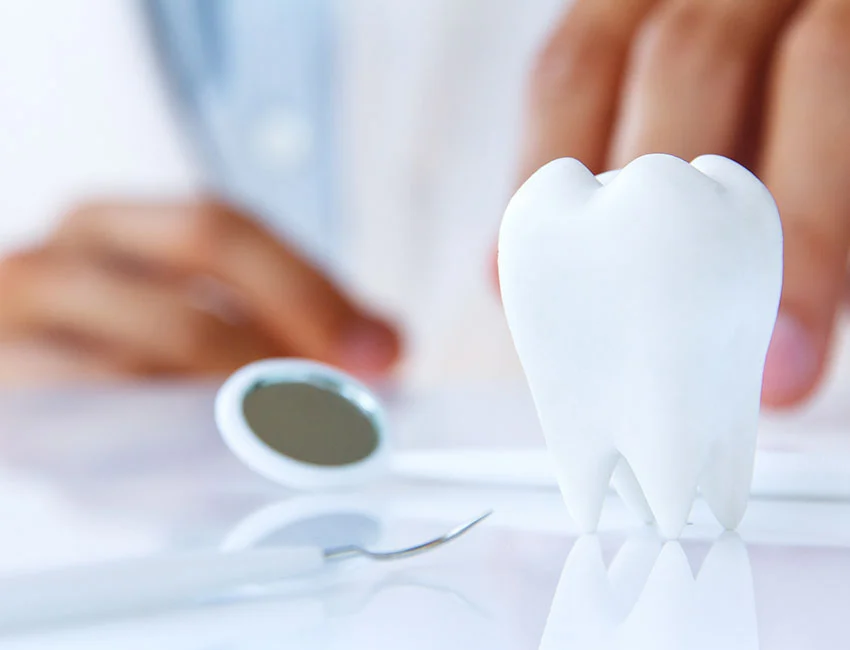Tooth Extraction in Sun Valley, CA
At Parsa Dental, our top priority is preserving natural teeth whenever possible. But sometimes, teeth can be damaged past the point of restoration, or painful emergencies may be a concern. When that’s the case, our dentist in Sun Valley, CA, may recommend tooth extraction.

Be proud of your smile
Tooth extractions don’t have to be intimidating
At Parsa Dental, we utilize modern technologies to extract problematic teeth with minimal discomfort and as stress-free as possible.
Should I Have My Tooth Extracted?
During your visit with our Sun Valley dentist, we’ll discuss whether or not your tooth can be preserved with other treatments. Such as periodontal therapy, root canal treatment, or a crown. If the tooth is non-restorable, it’s usually best to extract it before the condition spreads to adjacent structures.
Some of the most common reasons for removing a tooth include those related to:
- Traumatic injuries
- Dental emergencies
- Aggressive tooth decay
- Chronic periodontal disease
- Impacted wisdom teeth
- Orthodontic concerns related to spacing
- Full mouth reconstruction
We typically recommend extracting teeth as a last resort or when the health of adjacent teeth is at risk.
Types of Dental Extractions
During your dental exam, we’ll take an X-ray of your affected tooth to determine if it needs to be removed and which type of extraction is recommended:
Simple Tooth Extraction
Most dental extractions are what we call a simple extraction. These procedures can be performed using local anesthetic (numbing medication) and require minimal healing time.
Surgical Dental Extraction
If a tooth is impacted within the gum or bone tissues, a simple extraction is prohibited. Instead, surgical removal of the tooth is required. A classic example is wisdom tooth removal, which is usually regarded as a type of oral surgery. Surgical extractions can be performed by family dentists, oral surgeons, or other dental specialists.
Replacing Your Tooth After a Tooth Extraction
Other than removing wisdom teeth, dental extractions create excess spacing in your smile. These newly created openings can cause other teeth to drift out of alignment or wear down abnormally. Even the opposing teeth may “super-erupt” in an attempt to find a biting partner. To protect your smile’s integrity and alignment, it’s important to replace your extracted tooth at your earliest opportunity.
Common types of tooth replacements to consider include dental implants, a fixed bridge, or a partial denture. We’ll review the entire care plan with you so that you know how much time is involved and any additional fees to consider, including those related to sedation.
How We’ll Keep You Comfortable
Thanks to modern medications and technology, dental extractions are more comfortable than ever. All teeth will be numbed with local anesthetic, preventing any sensitivity when they’re removed. Adjacent tooth structures are also numbed. Some people also request to have their procedure completed with sedation. Inhalation sedation (like nitrous oxide or laughing gas) is safe and effective without any residual drowsiness. Deeper sedatives do require having someone with you to drive you home afterward.
After your extraction, we’ll provide you with important instructions on how to care for the surgical site. Most people do well with an over-the-counter anti-inflammatory like Motrin (ibuprofen) to manage their discomfort. You can usually return to work or school the day after a simple extraction or within a few days of a surgical extraction.

We proudly offer simple, surgical, and wisdom tooth extractions in our Sun Valley office. Contact our office today to schedule a tooth extraction consultation!
Tooth Extraction Procedure Step-by-Step
- Exam and X-ray: We’ll need to evaluate the tooth’s structural integrity and health to determine if complete removal is necessary.
- Planning: Depending on the type of extraction needed, we’ll provide you with a treatment plan listing the procedures and fees, as well as your estimated insurance coverage.
- Date of Extraction: We will numb the tooth and extract it, then apply pressure to stop residual bleeding. Be sure to follow your home can instructions to promote healing and reduce the risk of complications.
Extraction Aftercare Information
Following your dental extraction, be sure to follow your written home care instructions. This will help your mouth heal properly and reduce the risk of a dry socket. Some important things to remember include the following:
- Rinse with warm salt water after eating and throughout the day to reduce swelling
- Take all medication as directed
- Only chew on the opposite side of your mouth until the extraction site heals
- Eat a soft diet for the first few days
- For the first day, apply a cold compress to that side of your mouth on and off every 20 minutes
- Keep sterile gauze pressed onto the extraction site until the bleeding subsides
- Avoid straws, caffeine, alcohol, and tobacco products
Be sure to contact Parsa Dental if you have any concerns, such as bleeding, swelling, or infection.
How to Prevent Dental Extractions
Because most simple extractions are due to issues like decay or gum disease, preventative dental care is key. Plan to treat any issues early before they spread deeper into the tooth. Earlier treatments are more conservative and help preserve healthy tooth structure.
Bone Grafts After Dental Extractions
Removing a tooth triggers a natural bone resorption (shrinking) process around the socket, where the tooth roots previously set. Placing a bone graft in this space helps avoid bone loss, which is important if you are planning to get dental implants or need to reinforce the neighboring teeth.
Most bone grafts are installed on the same day as your tooth extraction. However, they are not necessary when removing baby teeth or wisdom teeth.

If you are experiencing discomfort or your tooth needs repair, we invite you to call our dental office today to schedule your appointment. We look forward to taking care of your oral health.
Cost of Dental Extractions in Sun Valley
The fee for a dental extraction will depend on the type of extraction it is, which tooth is involved, if you’re being sedated, and other factors associated with the procedure. Generally speaking, a simple extraction may cost between $150-$500, whereas a surgical extraction begins at around $300 per tooth. To prevent any confusion, our Sun Valley dentist will provide you with a detailed treatment plan outlining all fees
Tooth Extractions in Sun Valley, CA
If you suspect that your tooth needs to be extracted, contact Parsa Dental to discuss your extraction options. We’ll do everything possible to help you preserve your natural teeth or discuss replacement options if your tooth does need to be extracted. Financing options are available.
Questions Answered on This Page
- Should I Have My Tooth Extracted?
- Types of Dental Extractions
- Replacing Your Tooth After a Tooth Extraction
- How We’ll Keep You Comfortable
- Tooth Extraction Procedure Step-by-Step
- Extraction Aftercare Information
- How to Prevent Dental Extractions
- Bone Grafts After Dental Extractions
- Cost of Dental Extractions in Sun Valley
Related Topics

The Parsa Dental Experience
- Highest Level of Dental Care
- Friendly and Caring Staff
- Affordable Financing Options
- Personalized Dental Services
Frequently Asked Questions
Extractions are provided by general dentists as well as most dental specialists.
It’s important to take things easy for a day or two, as rigorous activity could delay healing or trigger a dry socket.
Definition of common tooth extraction terminology
Tooth decay (dental caries): Tooth decay is the breakdown of teeth due to acids produced by bacteria.
Tooth Enamel: Enamel is the thin outer covering of the tooth. This tough shell is the hardest tissue in the human body.
Tartar: Tartar is a hard yellowish substance that forms on your teeth and causes them to decay if it is not removed.
Cavities: A cavity is a hole in a tooth that develops from tooth decay.
Dental Checkup: A dental checkup is an appointment that involves cleaning the teeth, identifying any signs of infection and removing said signs of infection.
Preventive Dentistry: Preventive dentistry is the dentistry that focuses on maintaining oral health in order to prevent the spread of plaque, the formation of tartar and infections in the mouth.
Dental Sealants: Dental Sealants are thin coatings that when painted on the chewing surfaces of the back teeth (molars) can prevent cavities (tooth decay) for many years.
Oral Surgeon: A dentist with special training in surgery of the mouth and jaw.
Hear From Our Patients
Everyone was very nice and friendly. Very helpful as well ! The dentist was gentle and super nice and made me feel as comfortable as I was going to be.
Been here for two years and never disappoint! The staff is very friendly and nice! they explain everything to me and always ask if i have any questions! Also, i recommend doing root canals here! they were amazing when doing mine!
Amazing dentist and staff. Very professional and great customer service.
Book Your Free Consultation Today
Achieve the confident, beautiful, and healthy smile you deserve
About our Dentistry
- CA (License #105529). View License Information
- Insurance: We work with most insurance providers including Medi-Cal, Denti-Cal, and all PPO’s.
- No Insurance? No problem call (818) 767-6022 for more information.
- Financing Options: We offer a wide range of dental financing options.
- We serve patients from the following counties: Los Angeles
- We serve patients from the following cities: Sun Valley
- Have Questions? Please feel free to contact us at (818) 767-6022
Helpful links: WebMD (Tooth Extraction) | ADA (Glossary of Dental Terms)

